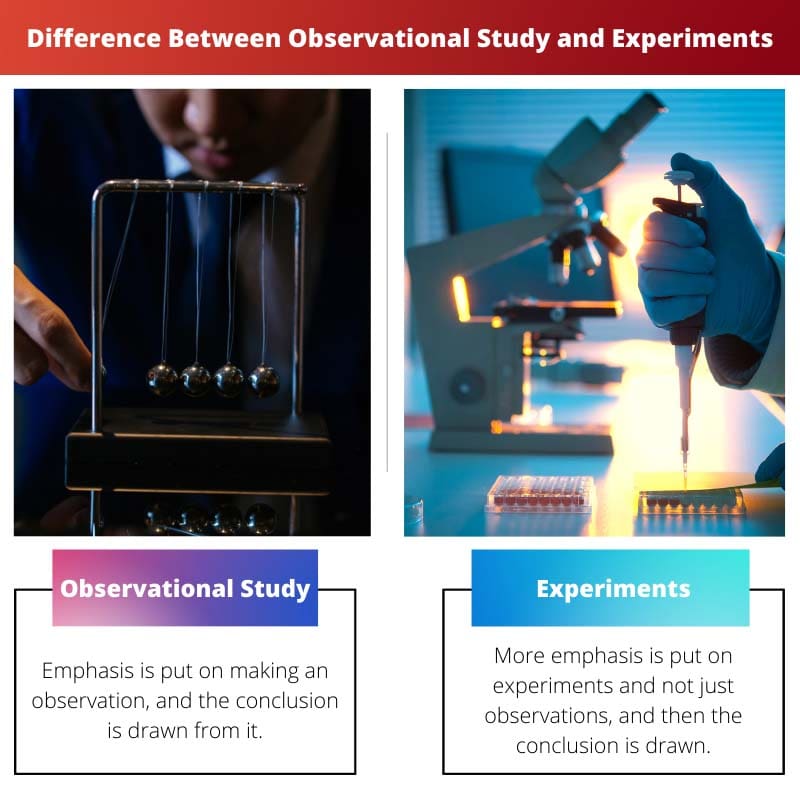The collection of data varies in different types and kinds of studies. In some studies, it is done spatially, whereas in others, it is done statically. In some studies, the researcher must conduct experiments to derive a conclusion.
Key Takeaways
- Observational studies are non-interventional research methods, while experiments are research methods where researchers manipulate variables to observe the effect on the outcome.
- Observational studies are used to explore a phenomenon or association, while experiments are used to test a hypothesis.
- Observational studies have limited control over confounding variables, while experiments can control confounding variables to a great extent.
Observational Study vs Experiments
In an observational study, study or research is done. There is no experimental or practical work. An observational study can be done on the collected data. The conclusion is based on observation in an observational study. In experiments, practical work is done. In experiments, researchers or scientists can try different studies or methods.

The study in which observations are counted is called an observational study. The way the observations are noted makes it different from another kind of study called an experimental study.
The study in which more importance is given to conducting experiments is called an experimental study. As the name suggests, the conclusion solely depends upon the data collected primarily after the experiments.
Comparison Table
| Parameters of Comparison | Observational Study | Experiments |
|---|---|---|
| Emphasis | Observations are counted. | Emphasis is given on experiments. |
Drawing the conclusion | Emphasis is put on making an observation, and the conclusion is drawn from it. | More emphasis is put on experiments, not just observations, and the conclusion is drawn. |
| Rely on | The researcher is expected to rely on the collected data. | The researcher is expected to observe various things through different studies or websites. |
| Human intervention | Does not Include Human intervention. | Includes Human intervention. |
| Example | Relationship between lung cancer and smoking. | Hawthorne studies |
What is Observational Study?
In the case of an observational study, it is not at all mandatory for the researcher to do any experiments. Still, he or she needs to make a list of observations and then can arrive at a conclusion. Observational study abstains from conducting any experiments.
Although there are many examples of observational studies, we will determine a relationship between the happening of lung cancer in humans and smoking. Thus, data were collected from those who smoke regularly and those who do not smoke.

What are Experiments?
In the case of experiments, the researcher must conduct experiments and then draw observations from them. In this type of study, manipulation can be done by the researcher in almost every aspect to conclude.
Hawthorne’s studies best set an example for an experimental study. This study was conducted in the Western Electric Company and the Hawthorne plant.

Main Differences Between Observational Study and Experiments
- In Observational Studies, observations are counted. On the other hand, in experiments or experimental studies, more emphasis is given to experiments.
- An observational study differs from an experiment or experimental study in how the observations are taken or noted.
- In an observational study, the person undergoing the study emphasizes making an observation, and the conclusion is drawn from it. On the contrary, more emphasis is on experiments, not just observations in experiments or experimental studies.
- In an Observational study, experiments are not done, and the researcher has to rely on the collected data. On the other hand, in the case of experiments or experimental studies, the researcher has to observe various things through different websites or studies.
- The observational study does not include human intervention. On the other hand, in the case of experiments, human intervention is quite common.
- An example of an observational study includes the relationship between lung cancer and smoking. On the other hand, an example of experiments includes Hawthorne studies.

- https://onlinelibrary.wiley.com/doi/abs/10.1002/0470013192.bsa454
- https://www.metheval.uni-jena.de/projekte/symposium2006/material/cook_shadish_and_wong.pdf

The content provides a clear and detailed comparison between observational studies and experiments. This is very interesting and enlightening.
I couldn’t agree more. The distinction between the two is crucial for proper interpretation of research results.
The clear examples provided greatly help in understanding the differentiation between observational studies and experiments.
The comparison between observational studies and experiments offers an in-depth analysis, but I echo the sentiment that real-life examples would further fortify the understanding of the theoretical distinctions.
Absolutely, providing practical case studies could significantly elevate the relevance and applicability of the contrasts between observational studies and experiments.
While the content is exemplary in distinguishing observational studies and experiments, integrating practical case studies would offer real-world context for these theoretical distinctions.
Agreed, real-life examples would provide valuable context to amplify the understanding and implications of the observed differences.
The article provides an insightful understanding of the key differences between observational studies and experiments. The detailed comparison is excellent.
The content is very informative and provides a comprehensive analysis, which contributes greatly to the understanding of these research methods.
Absolutely agree, it’s crucial to comprehend these differences to evaluate research findings effectively.
The comparison provided is insightful and thorough, offering a clear understanding of the nuanced differences between observational studies and experiments.
Agreed, the detailed comparison is intellectually stimulating and enriches the understanding of these research methods.
The detailed comparison between observational studies and experiments is commendable, yet augmenting it with practical case studies could enhance its applicability in real-world research.
While the theoretical distinctions are well-presented, integrating practical case studies could bolster the relevance of these concepts in research applications.
I concur, real-life examples would certainly provide context and enrich the practical understanding of observational studies and experiments.
The article presents a well-delineated contrast between observational studies and experiments, yet it could benefit from more direct real-life case studies to illustrate this contrast.
The detailed comparison is indeed enlightening, but incorporating tangible examples would enrich the applicability of the presented distinctions.
Absolutely, real-world case studies would amplify the value of this comparison by showcasing its implications in practical research.
While the article effectively contrasts observational studies and experiments, introducing practical case studies would certainly enrich the understanding of the distinctions and their implications.
I agree, the incorporation of real-world scenarios would greatly enhance the practical understanding of the discussed contrasts.
Addressing real-life examples would bolster the applicability of the theoretical comparisons to practical research scenarios.
While the article masterfully differentiates between observational studies and experiments, it still lacks real-world scenarios to illustrate the practical implications of these differences.
I concur, practical examples would certainly augment the application of the concepts addressed in the article.
The detailed comparison is commendable, but real-world applications could enhance the relevance and practical understanding of these research methods.
Although the distinction between observational studies and experiments is well explained, I feel the practical implications should be emphasized more.
I agree, understanding the practical impact of these differences in real-life research scenarios would add significant value.
While the theoretical comparison is detailed, exploring practical examples could enhance the applicability of the concepts discussed.